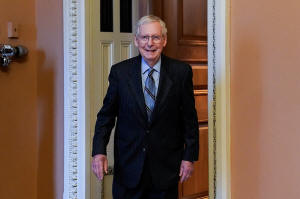McConnell departure could signal a more Trumpian turn for US Senate
 Send a link to a friend
Send a link to a friend
 [February 29, 2024]
By David Morgan [February 29, 2024]
By David Morgan
WASHINGTON (Reuters) - Mitch McConnell's decision to step aside as U.S.
Senate Republican leader raises questions about whether the chamber long
known for being slow and deliberative will be swept up in the heated
populism of Donald Trump.
In recent weeks, the Senate has taken on the more raucous atmosphere of
the House of Representatives, with Republican hardliners fighting a
bipartisan bill backed by McConnell to toughen border security and
provide more aid to Ukraine.
With McConnell, 82, planning to hand over the mantle to a successor
after the November election, hardliners hope their time has come to lead
the chamber.
Senators serve for six years and represent entire states, unlike their
House counterparts who are up for election every other year and
represent districts that are often drawn to insulate them from pressure
from the other party.
Lawmakers and aides say that has slowed the rising tide of populism in
the Senate, though some said times are changing.
"We're seeing this populist brand of leadership rise to the top,"
Senator Roger Marshall told reporters. "More of us that have been
elected more recently seem to be a little bit more populist driven."
The narrow 219-213 House Republican majority has proven difficult to
lead, having ousted former Speaker Kevin McCarthy last year and
repeatedly bucked his successor, Mike Johnson.

McConnell has held a far tighter rein, drawing opposition from
hardliners, some of whom urged him to step aside immediately.
Lawmakers including Senator Josh Hawley said a new Republican leader
would have a better relationship with Trump, who was president from
2017-2021 and is the frontrunner for the party's 2024 presidential
nomination.
"My question: is why wait so long? I mean, November is a long time
away," Hawley told reporters. "We need new leadership now. But this is
better than nothing."
While Republican hardliners railed against McConnell as insufficiently
allied with Trump, Democrats long reviled him for hardball tactics with
them. McConnell embraced the nickname the "Grim Reaper" for his success
in blocking their priorities even when he was in the minority, and for
helping Trump secure a 6-3 conservative Supreme Court majority that
expanded gun rights and ended a nationwide right to abortion.
FOREIGN POLICY IMPLICATIONS
A populist tilt in Republican Senate leadership could have serious
implications for U.S. foreign policy, including support for NATO and aid
to Ukraine's war effort against Russia, especially if Republicans
capture the White House and a Senate majority in the Nov. 5 election.
"On foreign affairs, there's quite a big divide between the Trump wing
of the party, which is the dominant wing, and the McConnell wing," said
Senate Republican Mitt Romney, a Trump critic.
[to top of second column]
|

U.S. Senate Minority Leader Mitch McConnell (R-KY) returns to his
office after announcing earlier in the day that he will step down
this year from his leadership role, at the U.S. Capitol in
Washington, U.S., February 28, 2024. REUTERS/Elizabeth Frantz

Bipartisanship could also be harder to pull off.
In recent weeks, hardline Senate Republicans worked to jettison a
bipartisan deal to address the flow of migrants across the
U.S.-Mexico border, after Trump opposed it, and worked against
efforts to deliver emergency aid to Ukraine, Israel, Taiwan and
other U.S. allies.
Republican Senator J.D. Vance, a staunch Trump ally, told reporters
that the Trump wing better reflects the Republican Party and the
views of Republican voters on critical issues than does the
McConnell wing.
"There was going to be a really contentious leadership election if
he (McConnell) had run (for leader) again in November. But it looks
like we're going to avoid that," Vance said.
With no serious challenge to McConnell's leadership since he was
elected to the job 17 years ago, it was unclear how many senators
would vie to replace him.
Three lawmakers - known as the three Johns - have been widely seen
as contenders.
Senators John Thune and John Cornyn have both worked closely with
McConnell as his top lieutenants, while Senate conference chair John
Barrasso, who has a harder conservative edge, is also no stranger to
the leadership team.
Other candidates, including from the far right, seem all but
certain.
Senator Rick Scott, who was defeated soundly by McConnell in late
2022, had plenty to say about the need for new leadership.
"There's a better way to run the Senate," Scott said. "We're not
dealing with the deficit. We've got a border that's completely wide
open. There's a lot of issues we've got to deal with."
Insiders say the job of getting elected party leader depends less on
political stances than on assuring rank-and-file senators that their
interests will be represented.Former McConnell aide Josh Holmes said
the next Republican leader should seek to acquire McConnell's knack
for insulating the conference from outside pressures.

"On a lot of occasions, he said he's more proud of his enemies than
his friends," Holmes told Reuters. "I'm sure there will be growing
pains, as there were with us when we started. To get really good
only comes with doing it."
(Reporting by David Morgan; Editing by Scott Malone and Howard
Goller)
[© 2024 Thomson Reuters. All rights reserved.]This material
may not be published, broadcast, rewritten or redistributed.
Thompson Reuters is solely responsible for this content. |